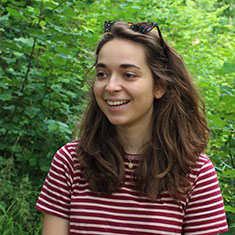Emily Strong
PhD Student

About me
I have always been fascinated with the natural world. Growing up in north-eastern Spain, my interest was fuelled by countless trips to local nature reserves and summers birding in the Scottish Highlands. My love of nature and wild places eventually led me to return to the UK to do a degree in BSc Zoology at the University of Aberdeen, from which I graduated in 2016. By the end of my degree I was determined to pursue a career in conservation, and I went on to obtain an MSc in Conservation & Biodiversity from the University of Exeter in 2017. During my time at university, I worked on various research projects focussing primarily on predator-prey ecology and conservation conflicts. After graduating, I worked at a wildlife research station in Sweden studying greylag goose ecology, and eventually joined WWT's Conservation team in 2018. In late 2020 I started my PhD in collaboration with WWT and the University of Exeter.
My project
My PhD research aims to investigate the environmental and social dynamics of lead ammunition use. Despite growing concern over the use of lead ammunition and its impacts on the environment, wildlife, and human health, lead is still widely used for live quarry shooting in the UK. My research aims to integrate both natural and social science methods to understand differences in the use, distribution and impacts of lead and non-toxic ammunition on the environment, as well as investigating the social processes underpinning the transition from lead to non-toxic alternatives. I also previously worked as a Researcher in the Ecosystem Health and Social Dimensions Unit at WWT, where I worked on a range of projects relating to avian influenza, lead poisoning, and health and wellbeing.
Experience and interests
- Fieldwork & ecological data collection
- Animal handling & collection of biometric data
- Laboratory procedures and diagnostic tests including ELISAs, PCRs and water quality analysis
- Statistical analysis & modelling in R
- Mapping spatial data with GIS
Publications
Strong, E.A., Redpath, S.M., Montràs-Janer, T., Elmberg, J. & Månsson, J. (2021) Seeking greener pastures: crop selection by Greylag Geese (Anser anser) during the moulting season. Ornis Fennica, 98.
Cromie, R., Newth, J., & Strong, E. (2019). Transitioning to non-toxic ammunition: Making change happen. Ambio, 48(9), 1079-1096.
Maund, P.R., Irvine, K.N., Reeves, J., Strong, E., Cromie, R., Dallimer, M. & Davies, Z.G. (2019). Wetlands for wellbeing: piloting a nature-based health intervention for the management of anxiety and depression. International journal of environmental research and public health, 16(22), 4413.
Muir, A., Ellis, M., Blake, D.P., Chantrey, J., Strong, E.A., Reeves, J.P. & Cromie, R.L. (2019). Sarcocystis rileyi in UK free-living wildfowl (Anatidae): surveillance, histopathology and first molecular characterisation. Veterinary Record.
Newth, J.L., Lawrence, A., Cromie, R.L., Swift, J.A., Rees, E.C., Wood, K.A., Strong, E.A., Reeves, J. & McDonald, R.A. (2019). Perspectives of ammunition users on the use of lead ammunition and its potential impacts on wildlife and humans. People and Nature, 1(3), 347-361.
Reeves, J.P., Knight, A.T., Strong, E.A., Heng, V., Cromie, R.L., & Vercammen, A. (2019). The application of wearable technology to quantify health and wellbeing co-benefits from urban wetlands. Frontiers in Psychology, 10, 1840.
Return to meet the team